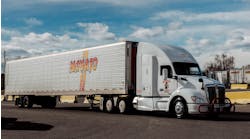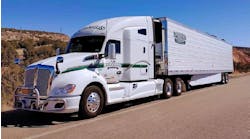SOME companies lead, while many others are content to follow. La Crosse, Wisconsin-based Kwik Trip Stores Inc certainly has been a leader when it comes to demonstrating the benefits of natural gas as a truck fuel for local and regional food distribution fleets.
Natural gas fueled trucks and tractors currently make up about 30% of the Kwik Trip distribution fleet, and the fleet will be fully on natural gas within the next two years. On the grocery side, the company runs 25 refrigerated straight trucks, 55 tractors, and roughly 100 refrigerated trailers that support more than 400 convenience store locations in four Midwestern states—Wisconsin, Minnesota, Iowa, and Illinois.
In addition to groceries, the Kwik Trip locations sell fuel, and natural gas is now part of the fuel mix at 18 of the c-stores. Kwik Trip supports the fuel marketing operations with a tank fleet that includes 60 tractors (20 of them fueled by natural gas) and 60 petroleum tank trailers. The company also owns one liquefied natural gas (LNG) trailer.
“We’re true believers in making LNG and CNG (compressed natural gas) go from alternative fuel to a standard fuel,” says Chad Hollett, Kwik Trip director of transportation and distribution. “We are adding CNG dispensers at more of our c-stores, and we will also supply LNG at locations along strategic interstate corridors.
“We are able to show customers and fleets that they can fuel with confidence and move forward with the purchase of CNG and LNG vehicles. Not a day goes by that we don’t get 50 to 100 calls to learn about our plans for natural gas. Customers want to know when it will be available in their area.”
Huge benefits
Joel Hirschboeck, Kwik Trip commercial fuels superintendent, adds that the company’s move to natural gas vehicle fuel was years in the making. “We observed what was happening around the world, and we found that natural gas makes a lot of sense,” he says. “The shale gas developments in the United States made natural gas even more attractive due to the positive price point. Natural gas also offers huge benefits from the environmental standpoint.”
From the very beginning, the Kwik Trip management team saw natural gas as a fuel for both its own fleet and for the broader marketplace, according to Hirschboeck. “Natural gas is a fit for many applications,” he says. “We have focused on CNG at most of our locations because that is what the market says it wants, but we will also distribute LNG where it makes sense. We’re focused on building out our natural gas infrastructure. We have several CNG fueling sites under construction now, and we will add eight more in 2014. Our natural gas dispensers are under canopy with the other fuel options we offer. With CNG delivered at 3,600 psi, our driver-friendly dispensers can fill a truck fuel tank in just 10 to 12 minutes.”
Standing out from the crowd is something the family-owned company has been doing since it was founded in Eau Claire, Wisconsin, in 1965. The company also has achieved success by making many of the products it sells and by offering those products at very competitive prices. At every store, the company offers bakery goods, milk, snacks, hot sandwiches, soft drinks, fresh coffee, and just about anything else a customer might need at a moment’s notice.
C-stores are supplied from Kwik Trip’s 360,000-sq-ft warehouse in La Crosse. The warehouse is part of a one million sq ft complex that includes a bakery, dairy, banana ripening rooms, and a kitchen for processing sandwiches, pizza, and soup. Most of the distribution fleet operates from the La Crosse facility.
Three units
Running under the Convenience Transportation LLC name, the distribution fleet is divided into three units. The Fresh Delivery Department has 30 drivers and is responsible for delivering all fresh bakery products and glazers and all cooler totes containing sandwiches, fruits, vegetables, and frozen pizzas. Eighty drivers in the Grocery Department deliver virtually all of the merchandise sold at the company’s c-stores and tobacco outlets. The Petroleum Department keeps 130 drivers busy hauling refined fuels to Kwik Trip stores and outside accounts.
Kwik Trip managers have developed multiple delivery models for the grocery distribution operation. In addition, most of the tractors are slip-seated for maximum productivity. The inventory replenishment system at the Kwik Trip stores captures every sale and reorder data goes directly to the warehouse.
Refrigerated straight trucks serve the Fresh Delivery Department, and drivers depart on their routes every evening. Straight trucks serve stores in a 100- to 150-mile radius of the La Cross facility. Drivers make 12 to 16 stops a night. Tractors with 40- and 48-ft multi-temperature refrigerated trailers handle stores as far out as 250 miles. While most Kwik Trip stores are open 24 hours, some of the short trailer shipments are on carts that are used for after-hours deliveries to stores that have closed for the day.
Every other day, stores get a tractor-trailer delivery of larger grocery items, including soft drinks, snacks, and milk. The tractor-trailer transports also haul cylinders of propane that is marketed under the Kwik Trip brand.
High mileages
Fleet vehicles average 200,000 miles a year keeping the 400 Kwik Trip stores supplied. That adds up to a hefty fuel bill every month, but the natural gas-fueled trucks are helping to trim the fuel costs. Hirschboeck says the company is saving about $800,000 a year with its CNG-fueled trucks.
“CNG sells for about $1.79.9 a gallon now at a majority of our stores,” Hirschboeck says. “We chose CNG for our distribution fleet, because the infrastructure is already in place in many areas. However, CNG and LNG both have a place in the market.”
Currently, 35 of the Kwik Trip trucks run on natural gas, and 20 of them are tractors. The numbers have grown rapidly since the company bought its first CNG-fueled trucks in 2012. Another 35 medium- and heavy-duty CNG fueled trucks are scheduled for delivery during the winter. Kwik Trip also has begun buying CNG-fueled pickup trucks.
The company runs a very diverse fleet that includes Kenworth, Freightliner, Peterbilt, Volvo, and Mack trucks. “We wanted to try all of the OEMs’ (original equipment manufacturers’) products to see how they perform with natural gas,” Hirschboeck says. “We want to gain as much knowledge as we can.”
The fleet’s first CNG-fueled trucks were specified with the 8.9-liter Cummins Westport ISL G engine rated for 320 horsepower. The trucks had Allison 3000 automatic transmissions. The terrain in the Kwik Trip operating area is relatively flat, and the trucks have performed well. Fuel economy has been in the six-mile-per-gallon range based on diesel equivalent.
“All of the trucks in our most recent orders were specified with the new 12-liter ISX12 G,” Hirschboeck says. “Horsepower ratings are 350 to 400. The first trucks we ordered with the 12-liter engine had Eaton 10-speed manual transmissions, but the latest order has the Allison 4000 automatic.
“The higher horsepower is important because we are running relatively heavy loads. Our tractor-trailer rigs gross out at 80,000 pounds.”
Trucks and tractors have dual 90-diesel-gallon-equivalent fuel tanks. On the newest vehicles, the fuel tanks are covered by a fairing that is more aesthetically pleasing.
All of the new tractors are spec’d for fuel hauling with a 6x2 drive configuration for cost savings and less weight. Components include air disc brakes all around, roll stability, Michelin widebase tires, tire pressure monitoring, and a Holland aluminum fifthwheel.
Bodies and trailers
Kwik Trip runs 26-ft Kidron and Morgan refrigerated bodies on single-axle trucks and 28-ft reefer bodies on tandem-axle trucks. The bodies have three inches of insulation in the sidewalls and four inches in the roof. Floors are flat aluminum. Tri-fold rear doors help control cold air loss. Thermo King supplies T-80 series refrigeration units on the trucks.
All of the trailers in the distribution fleet are refrigerated and are supplied by Utility Trailer Inc. Trailers have three inches of insulation in the walls, five inches in the floor, and four inches in the roof.
All of the trailers are set up for multi-temp operation with Thermo King Spectrum and Carrier Transicold Genesis and Vector refrigeration. Blue Tree Systems R:COM technology is used to monitor cargo temperatures and refrigeration unit settings.
Thermo King-equipped trailers have a center-divide multi-temp arrangement and rear swing doors. On trailers with Carrier refrigeration, temperature sections are separated by bulkheads from Randall and F&G. Trailers with Carrier refrigeration have side doors with ramps and rear roll-up doors.
All of the trailers have rear-mounted liftgates. Trailers also are fitted with stainless steel dock extensions that ensure a tighter air seal at the loading dock.
For running gear, the newest trailers are specified with Hendrickson’s Vantraax air suspension system, steel disc wheels, and Michelin dual tires.
Maintenance department
Fleet maintenance is handled in-house by 19 technicians at the company’s 20,350-sq-ft maintenance shop at the La Crosse location. Technicians are trained to repair and maintain refrigerated trailers, petroleum tankers, tractors, light- and medium-duty trucks, and automobiles.
Mechanics have been trained to perform minor and major repairs to CNG and LNG engines and fuel systems. The shop met virtually all of the natural gas requirements in the National Fire Protection Association’s 32A and 52 guidelines.
The company spent $45,000 to isolate one shop bay for LNG vehicle service. An extra air-handling system was installed along with a methane detection instrument.
Mechanics have received training on engine maintenance through Cummins Westport, and they have been instructed on fuel tank installations by Agility Fuel Systems.
Preparation procedures for engine and fuel system service include pulling the truck into the shop, closing the CNG valve on the truck, and running the engine to burn off fuel in the line. The purging process takes about 30 seconds.
When more detailed work is required, mechanics can use defueling ports on the fuel tanks to completely remove all of the CNG in the tank. The fuel tank can then be charged with nitrogen to eliminate any chance of fire.
The maintenance program helps ensure that the fleet is kept in top shape enabling efficient and timely delivery of groceries and other food products to
the Kwik Trip stores. ♦




